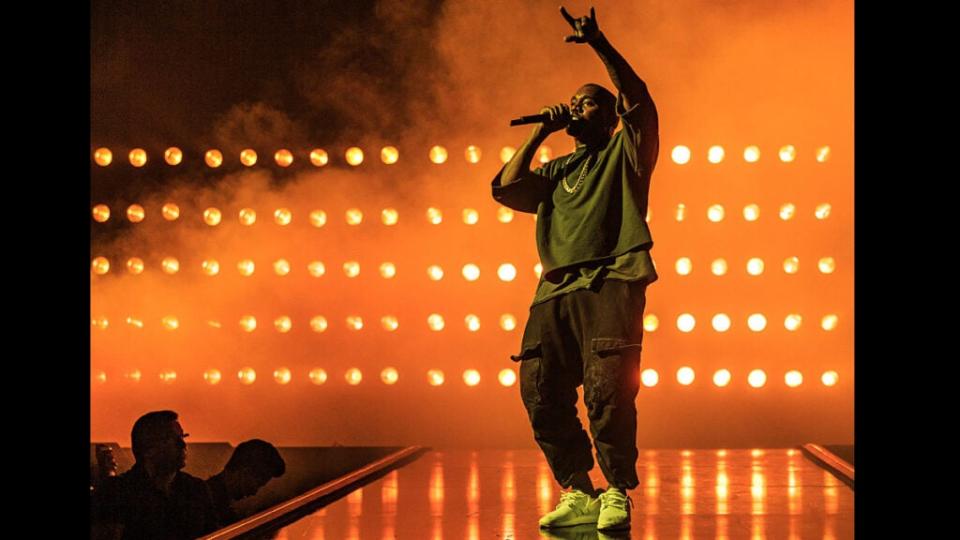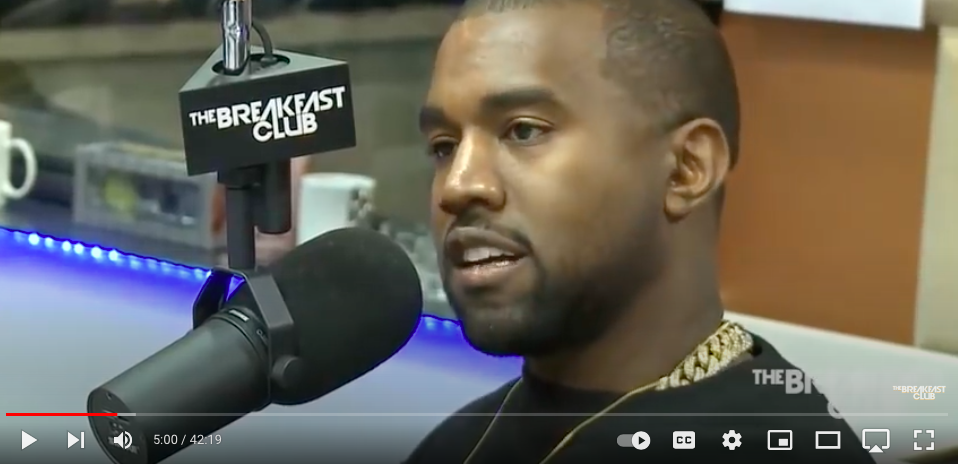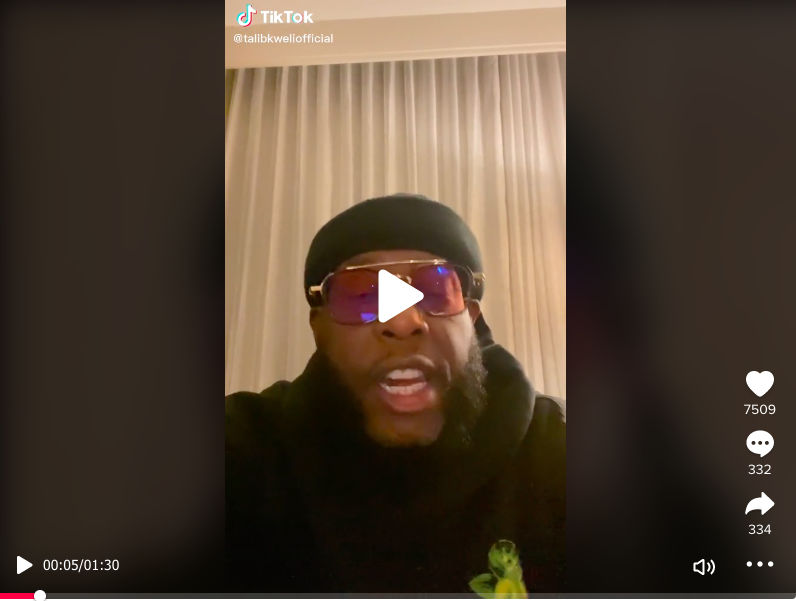Embattled rapper-turned-fashion designer Ye, formerly known as Kanye West, has spouted harmful stereotypes about Jewish people and repeatedly referenced Hitler and Nazis in song lyrics and public comments since the early days of his music career.
After an extensive review of Ye’s past comments, TheWrap found that the musician made problematic statements about the Jewish people — many of them public — as early as 2005. On more than a half-dozen occasions over the years, Ye repeatedly referenced Jews in harmful stereotypes, referenced Hitler or Nazis and used ethnic and anti-gay slurs — including in song lyrics that were never formally released.
Among the lyrics and statements were the following:
-
“I’m tight with my dough like my family Jews, Uh! I said ‘Jews’ my career is screwed” — Rock the Mic Freestyle, 2005
-
“And try to hit you with the ol-wu-wopte, ‘Til I got flashed by the paparazzi, Damn, these n—-s got me, I hate these n—-s more than a Nazi.” — “Flashing Lights,” 2007
-
“I walk through the hotel and I walk down the street, and people look at me like I’m f—ing insane, like I’m Hitler But one day, one day the light will shine through and one day people will understand everything I ever did, ever said…” — Big Chill Festival, Ledbury, England, 2011
-
“The world turnin’ Black slowly, where you can call ni—-s ‘n—-s,’ But you better not mention Hitler, so tell me who run the label, where the guns from?” — work track for “Nina Chop,” ultimately titled “Famous,” 2016
The examples were compiled by individuals who identified themselves as former associates of Ye, saying in a letter to TheWrap that they wanted to shine a light on his “long-time conspiratorial fixation on Jews and ‘Jewish power’ as well as a long-term evolved obsession with Adolf Hitler.” The trail of lyrics suggests that Ye’s recent flurry of antisemitic statements are not new, and that the pattern has been common knowledge in at least some music industry circles for more than a decade.
Also Read:
Kanye ‘Ye’ West Kicked Off Instagram Again After Another Antisemitic Post
Ryder Ripps, a former creative director for Ye in 2014 and 2018, said he has concluded that Ye’s remarks were more than just an artist seeking shock value. “He asked me, ‘Do you think it’s a problem that I study Nazis?’” Ripps told TheWrap, adding that he himself thought that was “psychotic.” And yet “there’s a fascination, admiration of Jews. He hired me and knew I was Jewish.”
Ripps recalled correcting Ye once: “Jews don’t run everything. My grandfather came to this country and ran a laundromat in Queens. It’s not some cabal.”
But according to Ripps, the rapper would say things like, “‘Jews have the codes.’ ‘I’d say ‘dude, that’s not true.’”
Ye, who once said he was diagnosed with bipolar disorder — though later claimed that he was misdiagnosed by a Jewish doctor — has been disavowed in recent weeks by brands like Adidas, The Gap and Balenciaga after he made a series of antisemitic comments on social media and to reporters — including a now-removed tweet that he was going “deathcon3” on all Jewish people — that sparked hate speech in Los Angeles, Florida and online. Universal Music Group confirmed that it ended its relationship with Ye as a recording artist with its Def Jam label in 2021.
TheWrap was unable to reach Ye or locate any current representatives for the artist for comment.
But TheWrap’s investigation found that Ye’s history of antisemitic statements has gone back for nearly two decades. At the Rock the Mic Freestyle event with Chicago-based radio personality Teefa in 2005, Ye rapped the following: “I’m tight with my dough like my family Jews, Uh! I said ‘Jews’ my career is screwed,” according to recordings posted on YouTube by ChiCity1 Entertainment about a year ago.


Brian Levin, founding director of the Center for the Study of Hate and Extremism at Cal State University, San Bernardino, said these lyrics reflect “an age-old trope respecting Jews being dishonest with money.”
In November 2007, in his “Flashing Lights” song on the “Graduation” album, Ye described paparazzi photographers as being more odious than Nazis and also used a controversial derivative of the N-word to describe them. “And try to hit you with the ol-wu-wopte, ‘Til I got flashed by the paparazzi, Damn, these n—-s got me, I hate these n—-s more than a Nazi,” the lyrics state.
Such comments are troubling because they serve to “minimize the atrocities of Nazism in a rather unbalanced, narcissistic way,” Levin said. “Any time that kind of evil is misdirected or minimized, it takes us off the path of actual knowledge about the myriad atrocities done during the Third Reich,” Levin added, noting this is especially crucial as survivors and researchers of Nazi atrocities are dying off and people are increasingly subject to disinformation.
Also Read:
‘SNL’: Dave Chappelle Talks About Kanye and Winks at Antisemitism in Monologue (Video)
“Jews are convenient [as a scapegoat] because they are historically and in contemporary society widely discredited as being evil — and it’s an amorphous fit and it goes across subcultures and ideologies and this is just the latest example,” Levin said, adding that such speech by influencers can correlate “to increases in hate invective online and even directed hate crimes on the streets.”
Antisemitic hate crimes are up in several major U.S. cities two years in a row. The city of Los Angeles has seen a 13% increase in hate crimes so far this year over the same period last year while New York City has seen a 35% increase, according to the Center for the Study of Hate and Extremism. “We see it in Europe from the far right. We see it in other parts of the world — this notion that Jews are dishonest or involved in some part of a cabal. It’s ubiquitous,” Levin noted.
In 2011, during comments Ye made on stage at the Big Chill music festival in Ledbury, England, he compared himself to Hitler, which reportedly elicited boos from the crowd. This was at a time he faced criticism that his “Monster” music video, which featured women on a noose and cannibalism, was misogynistic.
“I walk through the hotel and I walk down the street, and people look at me like I’m f—ing insane, like I’m Hitler. But one day, one day the light will shine through and one day people will understand everything I ever did, ever said…” he said from the stage.
During a November 2013 interview on “The Breakfast Club” podcast, Kanye echoed stereotypes about Jewish people being wealthy. “We ain’t Jewish! We don’t got family that got money like that!” he said in the interview. He also said, when referring to then-President Barack Obama’s challenges in making headway on his policy goals in Washington, D.C., that “Black people don’t have the same level of connections as Jewish people.”


Ye’s longtime collaborator and associate Malik Yusef defended Ye’s controversial lyrics, which he said in an interview with TheWrap are “100% for entertainment.”
Rap is “a lot of verbosity, but it’s also born out of rebellion so it has to be rebellious,” he said. “It actually has to skirt the lines, you know, because of the nature of that particular art.”
As far as comments Ye has made in interviews about Jewish people, Yusef argued that Ye should have called out the people he had problems with by name and not by their religion. “To criticize the manner in which he excoriated certain people in that group through kind of damaging the whole group was maybe juvenilistic [sic] on his part, but nevertheless, I would say, with a bazooka to my head that Kanye is not antisemitic,” Yusef said.
But Ye’s former creative director Ripps disputed that, alleging that one of Ye’s former employees was paid hush money by the rapper because “he had a tape of Ye saying I love Hitler. To delete the video, he paid out money.” NBC News, in a report earlier this month, said it reviewed settlement documents in that case. Ripps added: “This guy has been trying to sow the seeds of Nazism for years.”
Ripps also confirmed the widespread online reports that Ye wanted at one time to call his 2018 album “Hitler.” Ye hasn’t denied the rumors and it has been a subject of vigorous discussion in music circles. Ultimately, the Def Jam album came out under the name “Ye.”
“What do I think of Kanye calling his album ‘Hitler’? In 2018 I’d say he wanted out of his deal [with Def Jam],” Ripps said. “Now I don’t think that. I think he’s studied Hitler, and Nazis, and is using their playbook. I have no idea what his end goal is — he’s an egomaniac.”
While Ye has made antisemitic comments, Levin said it’s unclear what role his apparent mental health condition has “on his expression of paranoid ideations.”
Meanwhile, Yusef also repeated the belief that “Black people are Hebrews” and suggested it was rare for a Black person to be antisemitic. Ye, himself has claimed that Black people are “Jews” and “Semites” and therefore cannot be antisemitic.
According to the ADL, this belief found in Black Hebrew Israelite ideology claims that certain people of color are the true descendants of biblical Israelites. “Extremists use this concept to promote antisemitism, claiming that Jewish people today are imposters who stole the religious heritage of Black people and are engaged in a global conspiarcy to oppress non-Jewish people,” the ADL states on its website.
While the ADL notes that there’s no evidence that Ye views himself as a member of any organized extremist group, Ye has long had a relationship with Nation of Islam Leader Louis Farrakhan, who blames the Jewish people for Black oppression and has been deemed antisemitic by the ADL and the Southern California Law Center.
After the ADL called out Ye’s 2013 remarks on “The Breakfast Club” as “classic antisemitism,” Farrakhan told Ye in public comments not to apologize to Jewish people. Ye said at a concert that he had spoken to Farrakhan and wouldn’t apologize.
Ye later references his ongoing relationship with Farrakhan in the song All Day in 2016: “Just talked to Farrakhan, that’s sensei, n—-” and referenced Farrakhan’s lieutenant, Brother Don Muhammad, in a song by the same name in 2016, which included the lyrics “Black on Black lies is worse than Black on Black crime. The Jews share their truth on how to make a dime.”
Ye also visited the Nation of Islam’s Chicago headquarters in 2005 to express his support for its Millions More Movement, which commemorated the 10th anniversary of the group’s Million Man March, and attended an event that Farrakhan held in Los Angeles in 2015, according to the ADL.
Also Read:
Kanye ‘Ye’ West Claims He Lost $2 Billion in 1 Day in Fallout From Antisemitic Comments
TheWrap tracked many other instances of offensive language by the rapper:
In 2016, a work track for Ye’s song “Nina Chop,” which ultimately was titled “Famous,” leaked onto the internet with the following lyrics cut from the final version: “The world turnin’ Black slowly, where you can call n—-s ‘n—-s, but you better not mention Hitler, so tell me who run the label, where the guns from?”
Ye allegedly praised Hitler and Nazis during a TMZ live taping in 2018 during his infamous “slavery is a choice” interview. Former TMZ staffer Van Lathan revealed in a “Higher Learning” podcast episode last month that West said something like “I love Hitler. I love Nazis,” but that those comments weren’t included in the final cut for reasons that were unknown to him. TMZ founder Harvey Levin didn’t respond to TheWrap’s request for comment on this incident.
And TheWrap recently revealed that producers of David Letterman’s Netflix interview with Ye in 2019 edited out a reference to Nazis and offensive remarks about Rihanna and the physical abuse she endured from ex-boyfriend Chris Brown.
Amid last month’s flurry of Ye’s antisemitic comments, longtime Ye collaborator Talib Kweli argued on TikTok that Ye “has been thoroughly indoctrinated with Nazi propaganda.” In the post, which was directed to Ye’s crew, staff, friends and family, he also wrote “our silence is complicity at this point. Real friends don’t let their friends say Nazi stuff.”


Jewish people aren’t the only ones who have been targeted by the popular rapper. In a leaked track from 2018, Ye reportedly used slurs in a song called “DJ Khaled’s Son” to describe not only Jews but also gay people, Latinos and women. The song was never officially released but a portion of the song was first posted online about a year ago.
Meanwhile, his 2018 televised statement that “slavery is a choice,” wearing a “White Lives Matter” t-shirt and his recent mischaracterizations about the 2020 murder of George Floyd, an unarmed victim of police brutality, have offended many in the Black community.
Once one of the most influential rappers of his generation, Ye’s statements are compounded by two factors, according Miki Turner, an associate professor of Professional Practice at the USC Annenberg School and a former pop culture critic: He’s both “an attention whore,” who says and does things to incite people, and an individual grappling with a certain level of mental illness. “It doesn’t appear that any of the blowback ever really affects him and maybe that’s because he doesn’t hear it in its proper context,” Turner said. “For whatever reason, he may not realize the damage he’s doing.”
While she called Ye an “equal-opportunity offender” since his lyrics and statements have upset a wide range of groups — there’s “some sort of disconnect between him and the Jews,” she said, speculating that it might stem from some sort of trauma he suffered in childhood. “Why he’s just obsessed with this stereotypical image of the Jewish community, I don’t know where that comes from.”
Ye appears to have been spiraling downward since the sudden and premature 2007 death of his mother Donda, who raised him on her own and was likely a moderating force in his life, Turner said. “I have so much empathy for him right now,” she said. “It is so very clear that he is lost in space. I feel like there is nobody around him that can help him climb out of this hole he’s in and to me, that’s very very sad.”
Jody Armour, a professor of law at USC Law School, noted that he has heard many Black people suggest that Jews should be admired or emulated for being a historically marginalized group that has overcome adversity and generally excelled. Moreover, people do feel comfortable talking about different ethnic and religious groups, such as when people talk about the Jewish vote or the Black vote, and that doesn’t make people antisemitic or racist.
“The problem is when you go beyond that and say, you know, therefore, they are behind some kind of conspiracy,” he said.
Armour said that Ye has also spouted anti-Black sentiments and misogynoir — misogyny against Black women — “for a long time without real consequence” in his rap lyrics and public comments. “Was the Holocaust a choice? Would anybody say that any calamity is the fault of a marginalized community?” Armour said, referring to Ye’s “slavery is a choice” comment during the 2018 TMZ interview.
Even when voicing “viciously anti-Black stuff,” Ye has been given a significant amount of leeway by many journalists, media outlets and company owners, Armour added.
Sharon Waxman contributed to this article.




